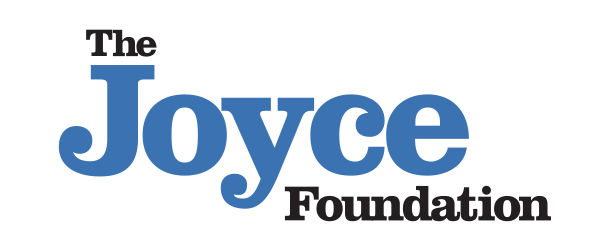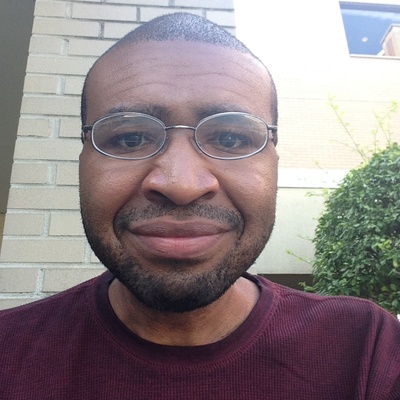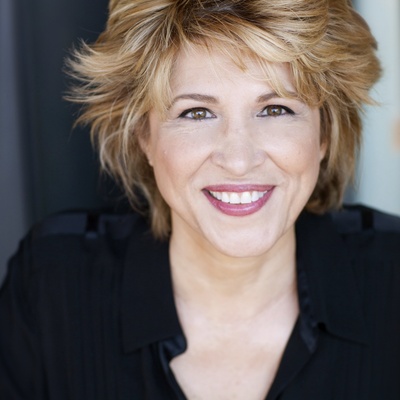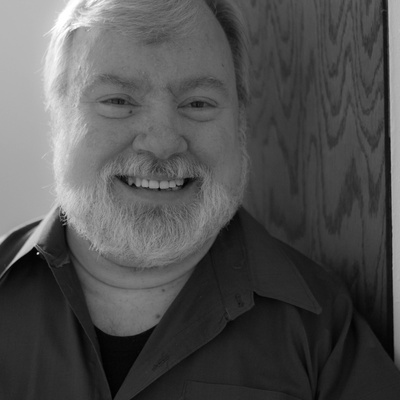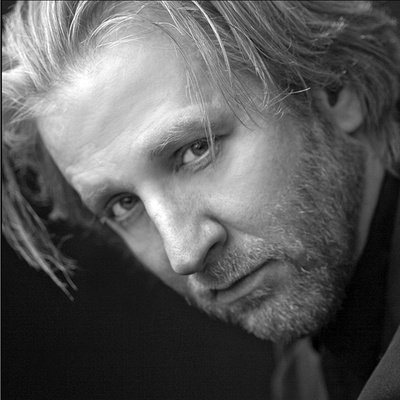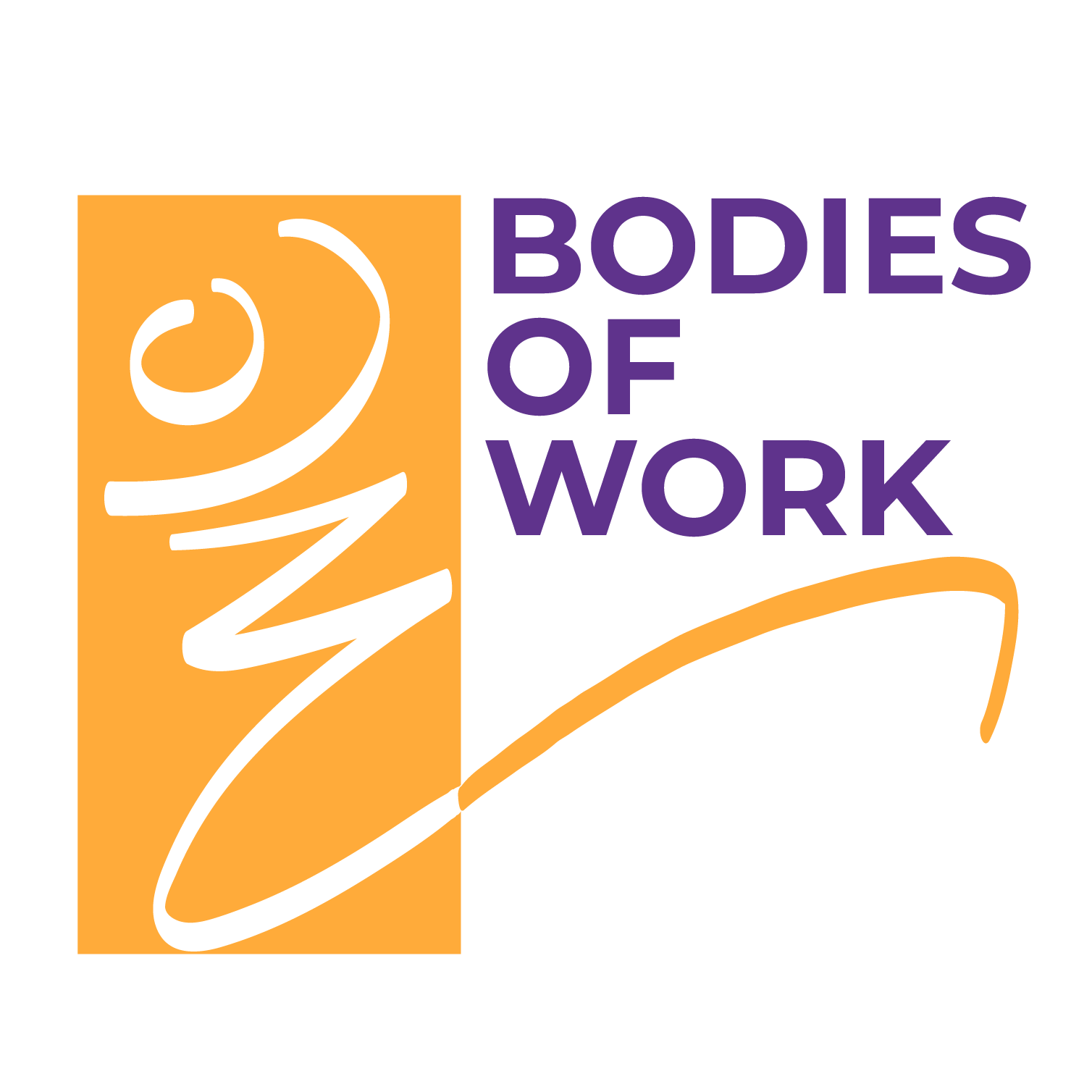On Representation
Spring 2020
Theater artists, Michael Herzovi, Arlene Malinowski, and Robert Schleifer, in conversation with filmmaker Justin Cooper. They talk about the challenges and opportunities of working on screen and on stage.
This is a transcript of the closed captions from the video conversation.
Justin Cooper: I had the opportunity to meet with Michael Herzovi, Arlene Malinowski, and Robert Schleifer. All of whom are involved in the performing arts and work to incorporate their activism into their artwork.
Arlene Malinowski has performed her critically-acclaimed autobiographical solo shows across the country and abroad.
Michael Herzovi is a multifaceted performer, activist, voice over artist, and writer. His work focuses on the concept that though living with a disability has its own special challenges we all face the common challenges of living.
Robert Schleifer is a teaching artist and actor and has taught workshops all over the world and has appeared nationwide in prominent theater productions earning outstanding performance awards for multiple roles.
We discussed Chicago Deaf and disability culture and how it fits into and conflicts with larger contexts of culture, how representation can be more equitable, and how they work to challenge assumptions about disability one character at a time.
Michael Herzovi: What drives me is basically a need for inclusion and to have my voice be a part of the world—if you will—to express what my place in the world is. It's easy for people to think that you're not able to do anything because of how I look. My goal is to wake people up and shake them up and show them that that assumption is wrong and to tell the truth of what I live and do it in a way that engages people and opens up their eyes and gets them to think about how they feel about what they do and even how they do what they do.
Arlene Malinowski: I write for myself, because of myself, by myself, for myself. Part of developing who you are as a person is to see yourself mirrored culturally and I think for a lot of Deaf and disabled people they do not get to see that in a profound way. What I found is that there are lots of representation in media of people, of Deaf, and people with disabilities that aren't authentic because they are written from or acted from the perspective of people that do not have that Deafness or disability and so I feel like that's my calling, to present the characters in a way that I understand and I see and present characters who have disabilities in the center of the narrative. The minority always understands the majority culture but the majority culture doesn't always understand the minority or underrepresented groups.
Robert Schleifer: ASL is a language, it's a language with its own culture and its own community. It has structure, its own grammar, which includes facial expressions, eyebrow movement, body language, hands, everything is part of ASL.
Robert: When I was in a residential school for the Deaf it was an oral program not a signing school, sign language was actually forbidden at the school I attended. There were plays there and when I saw them I knew that's what I wanted, I wanted that language so badly. The oral method was just not working for me so I became involved in theater at that time but in an oral way, but that wasn't helpful for me. So, what was helpful was the body language, the movements, the visuals, that was a part of the language development that I discovered and that's where I began to discover the body language, the movement, the visual language and that that was an intrinsic part of who I am instead of just learning how to pronounce words and speak.
#WhyISign videoJustin: Fascinating, and what is the relationship between Deaf and disability art and do you see yourself as part of both?
Robert: They both experience frustrations. They both face roadblocks. They don't contradict each other but at the same time, I just feel like I'm all alone in this. I feel like I'm walking on a tightrope with them, running parallel to one another.
Michael: We're a minority that is made up of minorities and what works for one sub-group could be absolutely useless to someone who is outside of that group.
Michael: You can put a ramp up to a door and it will help me get in but that doesn't do anything to someone who's Deaf or visually impaired and I think that's always been a problem. I think that is part of the reason that it's hard for us to be recognized in society, politically even, because one solution does not fit all. I think it's one of the reasons that makes us so overlooked.
Robert: Yes, by their actions, they show us that we're overlooked. People have a specific expectation of how we should behave, how we should act but it's different for Deaf people, blind people, people of other disabilities, it's different, and they don't want to see the truth, they're way up there, and then people with disabilities are way down here.
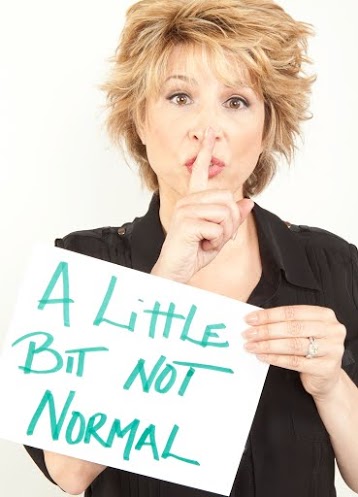 A Little Bit Not Normal
A Little Bit Not NormalArlene: The best way to cure it is to have more representation that there is not just one Deaf story, one story of mental health or mental illness one story of a physical disability. I think if we are represented more broadly that changes.
Michael: Here's the thing: you know that, I know that, I think everybody on this call knows that. The problem is that there are a lot of people who don't know that, and some even who don't want to know that unfortunately.
A couple of years ago I auditioned for a part in a cable TV show because they were looking for a character in a wheelchair, yay, I'm in a wheelchair. And I went and I auditioned and they wound up casting somebody who doesn't use a wheelchair and they just put the guy in a wheelchair but there were a ton of other people there to audition that day. in fact I think Justin... you were there that day.
Justin: I remember. Yes I was.
Michael: On the way out of my audition you were there along with like 20 other people.
Arlene: I think for a lot of Deaf and disabled actors, writers, we aren't considered for parts or being hired as a writer for things that are not "labeled" as Deaf or disabled. I might not get an opportunity to write for a TV show that doesn't have a Deaf or disabled character in it if Michael or Robert they may not have an opportunity to audition for "guy on the street who is the doctor," "person who serves." We don't get an opportunity to audition for them and I've also found when I was in LA I did a lot of television and film and what I also found was it was my job to educate them but we are not compensated for that education.
Writing a Solo Show. A Little Bit Not Normal.Michael: Oddly enough, last year in November I got exposure in a national television show it's going to be on Fox television and it was a great experience it was just amazing to see how more accommodating and accepting the so-called world of make-believe was as opposed to the so-called real world where whatever I needed was made for me on the spot. If I needed a ramp, if I needed help getting somewhere or doing something there was always someone there to give me a hand and it was a great opportunity to show what I could do when I have the opportunity to do it.
 Next
NextRobert: I still feel like the Chicago Deaf and disability culture is still a group that's unfortunately quite shunted to the side, overlooked, swept under the rug, pushed out of the limelight. Not only are we swept under the rug but people are walking on our heads they're walking across the rug and banging on our heads. Chicago is so deeply in my heart, I love Chicago so much, but we need to be better represented and the question is the how and what do we do to get there? And that's what I'm not sure of, I don't have the answer.
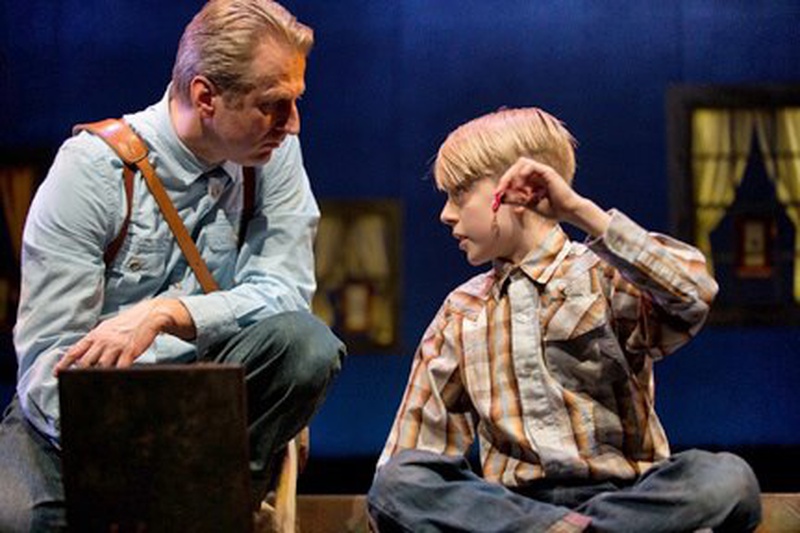 Robert on Stage
Robert on StageArlene: We have our one Deaf or disability book, play, whatever, and that's the thing that they do. Oh we've had a person who uses a wheelchair and then that's the one piece of art they do for seven years. We are viewed as a group of artists who contribute to a certain kind of art. So, I think it's difficult for our group to be viewed as part of the culture itself and I think that our very presence in the art world both as artists and the work that we produce is an act of activism where we can be ambassadors communicating that we do not speak for all Deaf and disabled people but be ambassadors and also to educate.
Justin: Yes, and you make you make a very good point because earlier when we did our interviews, actually Ginger Lane brought that up in terms of disability activism. Everything we do as Deaf and disabled people is performative. Arlene, can you talk about how your work relates to disability aesthetics, drawing upon your experiences within the fellowship.
Arlene: One of the great things about the fellowship was that it forced me to articulate what my work was. It forced me to put a prism onto my work, onto my experience, and to connect it.
Arlene: For instance being able to dialogue about how Iam using my body within space and talking to other artists has given me great insights, connecting with students from UIC and other artists from 3Arts put me into this incubator of other artists that were Deaf and had disabilities and being able to be affected by their work to understand other people's aesthetics really helped me hone my contexts and my understanding of aesthetics, by seeing other people and how they function within the art world. That's been such a gift to me.
Michael: Really our lives are about disability aesthetics because we're trying to find our place in society and we're trying to see how my culture, so to speak as a person with a disability, fits into the larger culture and what the residency fellowship did for me was make it probably make me more actively aware of that because I was able to talk to classes and be part of other workshops and hear other people talk about it more which I don't get a lot of because like all of us here I'm a writer and a solo performer and a lot of what I do is done kind of up to a point at least in a vacuum so being able to get out and see and hear what other people were doing in this was very very helpful and shape what I work on and what I write.
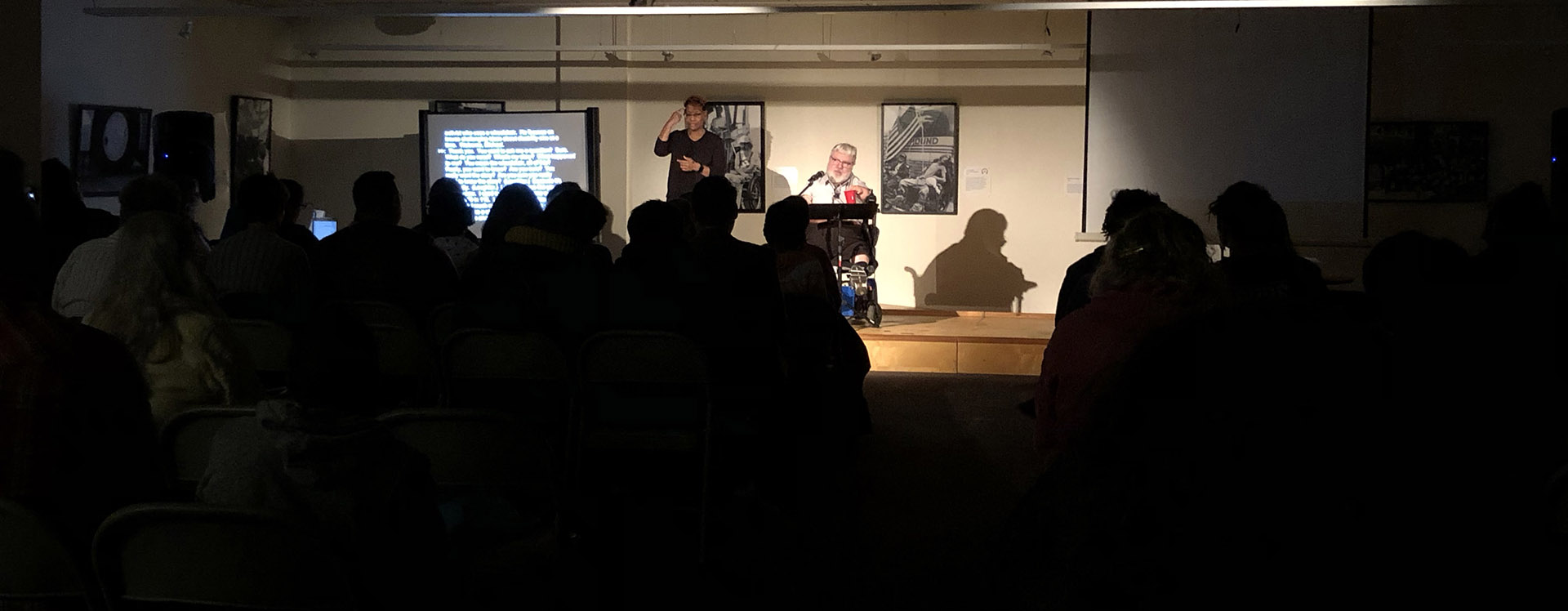 Disability Culture Cabaret
Disability Culture CabaretRobert: I felt like the gatekeeper was giving me an in and suddenly I had a foot in the door and I could walk right through. Whereas before I didn't know what was going where were the opportunities, I just didn't know where to look. With my involvement with UIC, as well as afterwards, I noticed a lot more opportunities opening up for me to teach more networking opportunities and opportunities to connect with people.
Robert: The excitement is building and the light is in my life and I wanna keep going and run with it.
Arlene: Standing on the shoulders of other Deaf and disabled artists and then creating ways and connections for other people, to have that as a foundation is remarkable.
Michael: And I think by doing that you help other people too and that all began with this community that I've been so lucky to be a part of.
Robert: It's just been a monumental thing for me and it will be etched on my brain and in my heart forever.
Arlene: I think one of the most important things that we can do for each other as artists and each other as people is just to be seen and to see someone and say, "I see you. I understand you. I recognize your humanity." I mean that's everything.
Justin: One of the things that's important when watching this particular session is you know, access, many people just see accessibility as, okay we put this ramp here, or okay we put this accessible button here and problem solved. Disability is not just one particular thing it's a variety of things and it's all of us coming together and working on getting that access for all. That's one of the things that really stood out to me during this conversation.
The Disability Culture Leadership Initiative and 3Arts/Bodies of Work Residency Program are supported in part by grants from
the Joyce Foundation and the National Endowment for the Arts.
